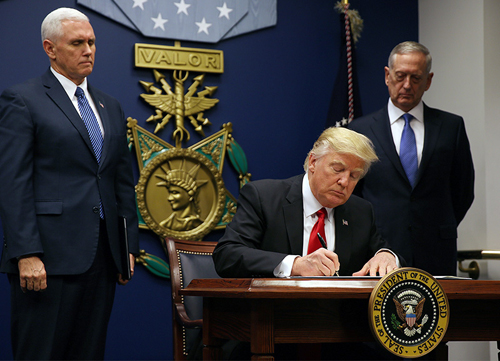US President Donald Trump took a second swing at his temporary travel ban, this time targeting travelers from six majority Muslim countries and crafting his executive order in ways intended to survive challenges in US courts.
The new ban, which goes into effect on 16th March, no longer restricts travel from Iraq, one of seven listed in the original order. The 90-day ban now is limited to Iran, Libya, Somalia, Syria, Sudan and Yemen.

US President Donald Trump signs a revised executive order for a US travel ban, leaving Iraq off the list of targeted countries, at the Pentagon in Washington, D.C., on 6th March, 2017. PICTURE: Reuters/Carlos Barria
As before, the order shuts down the US refugee program for 120 days to give the federal government time to develop “extreme vetting” procedures to prevent terrorists from entering the country. However, Syrians are no longer subject to an indefinite ban, as they were under the first order.
The White House spent weeks drafting the revised ban, coordinating with the departments of State, Justice and Homeland Security to avoid the chaos that followed the 27th January order. That one took immediate effect, snarling travel for thousands of people around the world and at US airports. This time, federal agencies will have 10 days to prepare before the order goes into effect.
President Trump signed his first order during a highly-publicised signing ceremony at the Pentagon. On Monday, 6th March, he signed the order in private and sent out Secretary of State Rex Tillerson, Attorney General Jeff Sessions and Homeland Security Secretary John Kelly to issue brief statements.
“It is the president’s solemn duty to protect the American people, and with this order, President Trump is exercising his rightful authority to keep our people safe,” Mr Tillerson said. “As threats to our security continue to evolve and change, common sense dictates that we continually reevaluate and reassess the systems we rely upon to protect our country.”
While the goal of the executive order remains the same – keeping terrorists out – the administration made several other big changes to avoid being struck down in court.
Nationals of the six countries with legal permanent residence in the US (known as green card holders) are not affected. People with valid visas as of Monday also are exempt. And the order no longer gives immigration preference to “religious minorities,” such as Christians who claim they are persecuted in mostly Muslim countries.
Iraq was dropped from the ban after negotiations with the Iraqi government, which vowed to improve the security of its travel documents, share more information on its citizens with the US Government and agreed to accept Iraqi nationals who have been ordered deported from the US, according to a senior Homeland Security official, who spoke on condition of anonymity to fully discuss the new order ahead of the president’s signing.
A federal judge in Seattle issued a nationwide hold on the order after lawyers for travelers detained at US airports filed lawsuits. His ruling was upheld by the 9th US Circuit Court of Appeals.
Civil rights and immigration advocacy groups vowed to challenge Trump’s order in court, arguing that the tweaks made by the White House don’t change the underlying problems facing the travel ban.
Margaret Huang, executive director of Amnesty International USA, said the new order amounts to “the same hate and fear with new packaging.” And Omar Jadwat, director of the ACLU’s Immigrants’ Rights Project, said the only way to fix the “Muslim ban” is to not have one at all.
Meanwhile, many religious groups and faith leaders see no meaningful difference in the new measure.
Linda Hartke, president of Lutheran Immigration and Refugee Services, said in a statement that while “it appears that the Administration has sought to correct some of the flaws contained in the first executive order, this newly issued one still prevents us from undertaking life saving work during the most critical time for refugees and displaced persons in human history”.
“The new order doubles down on demonising refugees – implying that America should fear those who have been persecuted, tortured, threatened, and victimised by terrorists,” she continued.
And some who advocate for the Middle East’s beleaguered Christian minorities worry that the removal of special protections for minority religions necessitates a new order to address their suffering at the hand of the group known as the Islamic State.
“There’s a dire need for Pres. Trump to issue a separate executive order – one specifically aimed to help ISIS genocide survivors in Iraq and Syria,” Nina Shea, director of Hudson Institute’s Center for Religious Freedom, said in a statement after the new executive order’s release.
“For three years, the Christians, Yizidis and others of the smallest religious minorities have been targeted by ISIS with beheadings, crucifixions, rape, torture and sexual enslavement,” she said.
Reuters contributed to this report





